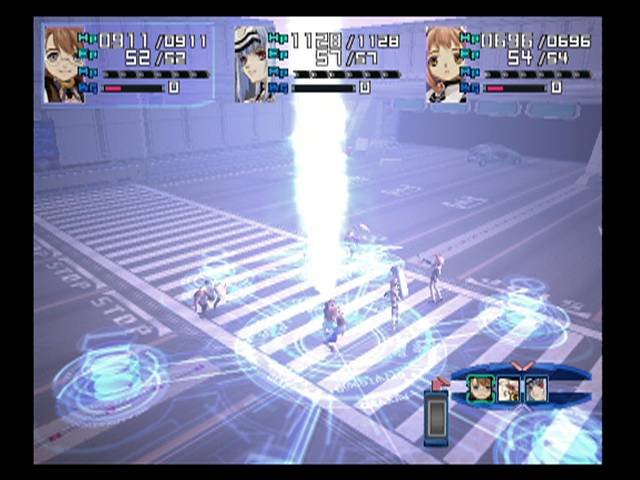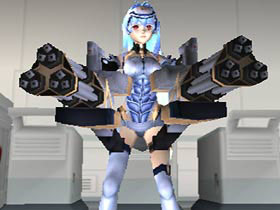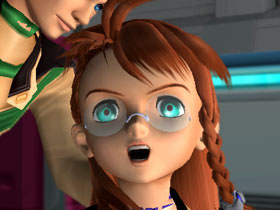 |
Xenosaga - Review
|  |
Testament of Will
By: Red Raven
| Review Breakdown | | Battle System |
8
| | Interface |
8
| | Music & Sound |
9
| | Originality |
9
| | Story & Plot |
9
| | Localization |
10
| | Replay Value |
7
| | Visuals |
9
| | Difficulty |
Hard
| | Completion Time |
40-60 Hours
| | | Overall |

|
 | |
One of the less flashy deathblows. |
|
Most games you simply play. You turn them on, exercise your wits and reflexes for a few hours, and then you turn them off. There are a precious few games that you instead experience. You turn them on, and then they play you; they manipulate your emotions, they challenge your beliefs, and they expand your mind. You can turn them off, but they stay with you long after you leave the room. The original Xenogears was one such game, and I'm proud to report that Xenosaga is yet another.
It never ceases to amaze me though, how many people will inevitably complain games such as Xenosaga focus "too much" on story and plot and "not enough" on gameplay aspects. It was widely reported that Xenosaga is but one episode of six ambitiously weaving a tale spanning 10,000+ years across space and time. Furthermore, Xenosaga's subtitle, "The Will to Power," bears the name of Friedrich Nietzsche's most well-known philosophical masterpiece, a book in which he decisively describes the primary motivation of all living things. The era in which the extent of an RPG's plot is measured in the number of evil empires toppled is over; if you feel as if a "mere" game such as Xenosaga tries too hard or is too highbrow for its own good then perhaps you are in the wrong genre. My suggestion would be to pursue a pleasant Adventure game like new Zelda or Dark Cloud instead.
With that said, does Xenosaga live up to its promise of plot complexity and merit? Yes, it does. Indeed, the only other RPG that surpasses Xenosaga in this respect is Xenogears, and that is saying something. Based entirely in a science-fiction setting far into the future, Xenosaga nevertheless is still deeply immersed in the pain and struggle between individual human beings. As a consequence of one of the best localization treatments an RPG has ever had and some of the best videogame voice-actors this side of Metal Gear Solid, the characters act and appear distinctly human (even when they technically are not). You start to relate with them, care about their experiences, feel their pain, and are overjoyed when they triumph over seemingly impossible obstacles. The plot scope is equally vast and the only thing that prevented Xenosaga from earning a perfect ten in this regard is its episodic nature: completing the game does not make one feel complete, and questions are raised only to be left unanswered for future episodes. While this does not and should not detract from the overall plot experience, it falls somewhat short of what the prodigious Xenogears managed to accomplish in a singular package and thus it does not earn a similar score.
 | |
Resistance is indeed futile. |
Despite exaggerations to the contrary, a majority of Xenosaga is actually spent battling, exploring dungeons, tweaking characters, and so on. The battle system itself can be best described as a hybrid of FFX and Xenogears. Each character begins battle with 4 Action Points (AP), which allows them to make two attacks (either physical, magical, or a combination), use items, call their A.G.W.S., use ether (magic), or defend. By only attacking once or defending, your character gains an additional 2 AP on their next turn allowing access to the "deathblow" special moves that populated Xenogears. The flow of battle is turn-based, with a small window in the corner dictating whose turn is coming up next, ala FFX. This window does not dictate everyone's turn however, and so it leaves an element of chance when it comes to choosing whether to attack or defend based on whether a member of your party's turn is next.
The other features of battle that are noteworthy are the Event Slot, Boost Gauge, and A.G.W.S. After each character takes their turn, a small reel (the Event Slot) clicks forward and shows one of four pictures: blank (nothing), explosion (critical hit rate up), ring (boost gauge increase), ring with plus (bonus experience). These states are not trivial matters as a well-timed critical (or denial of an enemy critical) can spell the difference between victory or defeat in the hardest battles this side of, well, the SNES era. The Boost gauge appears beneath each character's portrait and this gauge increases whenever that character deals damage. After it fills up completely that character can "boost" and take an immediate extra turn after the current one. Enemies can take advantage of Boosting as well, so despite the turn-based structure of combat, battling still feels exciting and fast-paced. The Gears from Xenogears are back--more or less--in Xenosaga under the new moniker of A.G.W.S. Forget everything you heard about these machines being "unnecessary" or "useless": often they are the only thing that separates you from annihilation at the even more difficult boss battles. The fuel concerns from Xenogears have been eliminated so A.G.W.S. are functionally similar to the Guardian Forces from FF8 in terms of use and general strategy. They may not be as flashy as they were in Xenogears but they serve their purpose-keeping your characters alive-well enough...if you keep them upgraded on a fairly consistent basis.
Another large segment of play time will be spent outside of battle, upgrading your characters with not one, not two, but three different categories of battle rewards besides normal experience points. The first new category is Tech Points (TP). These points are normally spent upgrading the numerous deathblows each characters earn: they can be made more powerful, have a shorter "cooling time," and perhaps most useful, made so that the deathblow need not require the full six AP to execute. Besides deathblows, TP can also be spent upgrading individual character statistics directly such as gaining another point of Strength or another 10 HP. Another category is Ether Points (EP). With EP you have the option of "evolving" your magic spells (and therefore gaining access to new spells) or transferring them to other party members so that both characters can have the same spell, for half the EP cost of evolving the spell. Finally, there are Skill Points (SP). These points allow you to extract skills from armor and accessories so that you can gain their benefits (Poison Resistance, Physical Defense Up, and so on) without having to wear them. Juggling six characters' equipment, experience, TP, EP, and SP can become overwhelming at times, although it is always nice to have a greater opportunity to customize your characters in such a fashion. The menus relating to all this upgrading could have been a little more user-friendly, but they will quickly become second nature when you start to realize how important such character tweaking really is.
The in-game visuals for Xenosaga are not all that impressive until you make the realization that this game was designed before the release of FFX--the game that remains the benchmark for RPG graphics. This is not to say that the visuals are sub-par, it is just that the majority of the game takes place in space stations and ships which are about as visually interesting as sterile hospitals. Whenever the action moves to one of the many in-game cut scenes however, it then becomes apparent where a lot of time and graphical care was spent. Character facial expressions are hauntingly realistic, conveying far more information in a single smirk, raised eyebrow, or expression of pain than two paragraphs of text. Although much of the game does indeed take place in nondescript interior locations, Xenosaga makes fabulous use of color whenever it can. For example, battles are extremely flashy even when the characters are doing normally benign actions such as using a potion or completing a regular attack. While some might see this as annoying since one will be battling quite a bit throughout the game, it remains a nice visual change of pace.
 | |
I did the same thing after finding out how long until Episode 2. |
If there is any one area in which I could state that prevented Xenosaga from achieving its perfect potential though, it would have to be the area of audio. The music itself is brilliant, moving, expertly performed by the London Philharmonic Orchestra, and penned by none other than the musical genius, Yasunori Mitsuda. However, in a decision that I will never be able to understand, the vast majority of the game is played in almost abject silence. Ambiance is there, and its presence is (somewhat) justified insofar as the setting of deep space is concerned. Regardless of any setting or style justification though, the overall experience of the game is tangibly lessened when denied the beautiful soundtrack whilst traveling through dungeons or strolling through space stations. If the music was less than perfect I might be able to better cope with its absence during play; it is nothing short of pure torture when the epic and haunting score fades to ambience moments after a climatic cut-scene ends and the dungeon crawling begins.
While the subtle goal of every reviewer is to cast their favorite games in an appealing light, I will-in Xenosaga's case-instead issue a word of warning. Be very sure that you are willing to give Xenosaga a chance to weave its fantastic tale to the very end. The first ten hours of the game will undoubtedly turn away countless potential fans in its clumsy execution while countless others will never give the "interactive movie" a chance to begin with. If you feel your money is better spent elsewhere, then by all means do not waste it on a game that you can never enjoy. For the rest: have fun experiencing a game which transcends its ultimately shallow peers through the first chapter of what promises to be the greatest story our medium has ever told.
Stand tall and shake the heavens, indeed.
|







